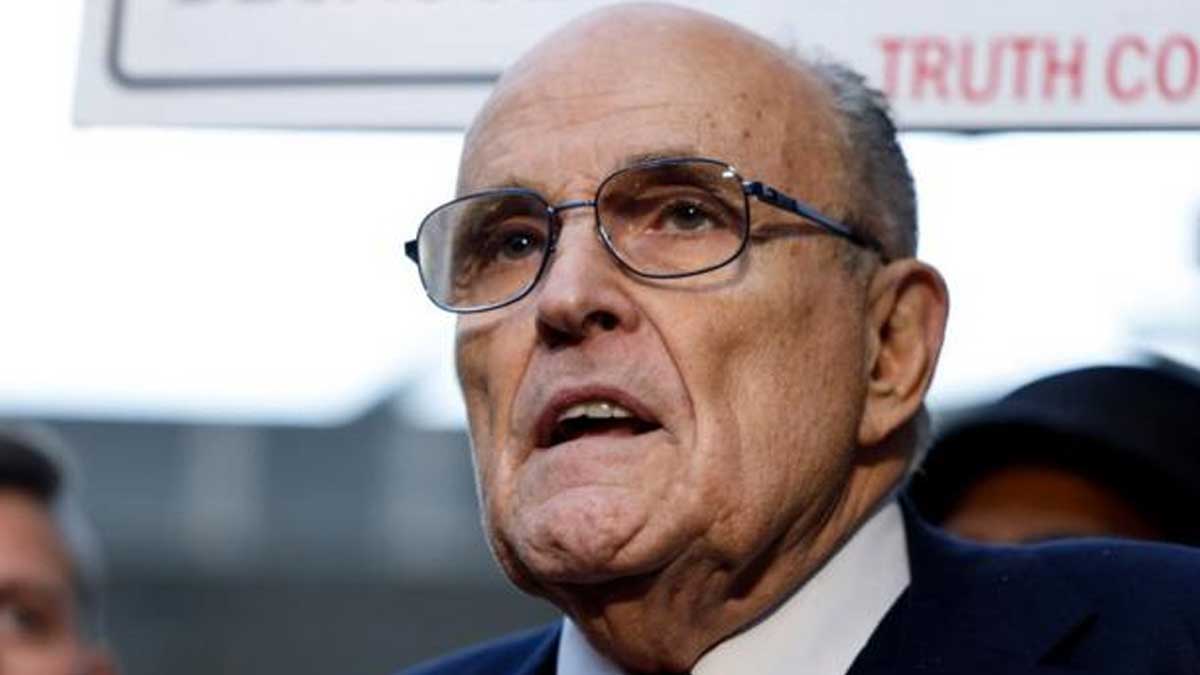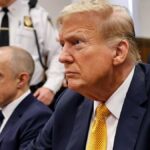- Home
- Billionaires
- Investing Newsletters
- 193CC 1000
- Article Layout 2
- Article Layout 3
- Article Layout 4
- Article Layout 5
- Article Layout 6
- Article Layout 7
- Article Layout 8
- Article Layout 9
- Article Layout 10
- Article Layout 11
- Article Layout 12
- Article Layout 13
- Article Layout 14
- Article Sidebar
- Post Format
- pages
- Archive Layouts
- Post Gallery
- Post Video Background
- Post Review
- Sponsored Post
- Leadership
- Business
- Money
- Small Business
- Innovation
- Shop
Recent Posts
Giuliani Pleads Not Guilty to Arizona Election Charges After Delays

Former Trump attorney Rudy Giuliani pleaded not guilty on Tuesday to nine state felony charges stemming from his alleged involvement in a scheme to falsely declare former President Donald Trump the winner of Arizona in the 2020 election. Giuliani’s plea follows a period during which Arizona officials struggled to serve him with a court summons. The charges against Giuliani, who served as mayor of New York City from 1994 to 2001, include fraud, forgery, and conspiracy. These charges are related to a plot to appoint 11 fake pro-Trump electors in Arizona, even though President Joe Biden won the state. The indictment by an Arizona grand jury in April marks the latest legal challenge for the former mayor.
Giuliani was indicted alongside 18 others, including former Arizona GOP chair Kelli Ward, who also pleaded not guilty earlier on Tuesday. The scheme aimed to create a slate of false electors to support Trump, part of a broader effort to overturn the 2020 election results. Giuliani is no stranger to legal trouble, as he was also charged with election-related crimes in Georgia last year. However, unlike in Georgia, Arizona prosecutors have not charged Trump himself in connection with the scheme. The indictment also names other prominent Trump allies such as former lawyer Boris Epshteyn and former chief of staff Mark Meadows, whose arraignments are scheduled for June 18 and June 7, respectively.
John Eastman, another lawyer for Trump who faces racketeering charges in Georgia, pleaded not guilty to the Arizona charges last Friday. Christina Bobb, a former Department of Homeland Security executive secretary under Trump and the current head of the Republican National Committee’s election integrity unit, also pleaded not guilty on Tuesday. Several individuals who were to serve as the fake electors have similarly entered not guilty pleas. The breadth of the indictments underscores the extensive nature of the alleged conspiracy and the involvement of multiple high-profile figures in Trump’s orbit.
Ted Goodman, a spokesperson for Giuliani, dismissed the charges as politically motivated. He described them as “a cut and paste version of what they’re attempting to use to interfere with the 2024 Election and to take down President Trump.” Goodman expressed confidence that Giuliani would achieve “full vindication.” This defense aligns with a broader narrative among Trump’s allies that the legal challenges they face are part of an effort to undermine Trump’s political prospects ahead of the next presidential election.
Arizona Attorney General Kris Mayes announced the charges against Giuliani and the other co-conspirators in April, following a comprehensive investigation by a state grand jury. The indictment details a concerted effort to overturn the legitimate election results in Arizona by creating a slate of fake electors pledged to Trump. Despite the seriousness of the charges, it took Arizona authorities over three weeks to serve Giuliani with a subpoena. During this period, Giuliani taunted the state’s prosecutors on social media. In a now-deleted post on X, formerly Twitter, he wrote, “If Arizona authorities can’t find me by tomorrow morning: 1. They must dismiss the indictment; 2. They must concede they can’t count votes.” Giuliani was eventually served the subpoena on Friday night at a surprise party for his 80th birthday in Palm Beach, Florida. The event was attended by Trump, former campaign manager Steve Bannon, and conservative operative Roger Stone, highlighting Giuliani’s continued influence and connections within Trump’s inner circle.
Several key Trump lawyers implicated in the scheme have yet to enter their pleas. Among them are Michael Roman, who served as the Trump campaign’s director of election day operations, and Jenna Ellis, another Trump attorney. Ellis was also indicted by a Fulton County grand jury on racketeering charges in Georgia for her efforts to overturn Biden’s victory in that state. In October, Ellis changed her plea to guilty in the Georgia case, adding another layer of complexity to the legal battles surrounding Trump’s attempts to challenge the 2020 election results.
While Trump was not charged in the Arizona case, he is reportedly included in the indictment as “Unindicted Co-conspirator 1.” This designation suggests that prosecutors view Trump as a central figure in the alleged conspiracy, even if they have not formally charged him at this time. The inclusion of high-profile names and the extensive nature of the charges reflect the ongoing legal scrutiny of Trump’s efforts to contest the 2020 election results and the involvement of his close associates in these activities.
Recent Posts
Categories
- 193cc Digital Assets2
- 5G1
- Aerospace & Defense44
- AI32
- Arts3
- Banking & Insurance11
- Big Data3
- Billionaires224
- Boats & Planes1
- Business304
- Careers13
- Cars & Bikes66
- CEO Network1
- CFO Network17
- CHRO Network1
- CIO Network1
- Cloud10
- CMO Network18
- Commercial Real Estate7
- Consultant1
- Consumer Tech155
- CxO1
- Cybersecurity51
- Dining1
- Diversity, Equity & Inclusion4
- Education7
- Energy8
- Enterprise Tech29
- Events11
- Fintech1
- Food & Drink2
- Franchises1
- Freelance1
- Future Of Work2
- Games135
- GIG1
- Healthcare74
- Hollywood & Entertainment154
- Houses1
- Innovation37
- Investing2
- Investing Newsletters4
- Leadership65
- Lifestyle10
- Manufacturing1
- Markets20
- Media183
- Mobile phone1
- Money13
- Personal Finance2
- Policy542
- Real Estate1
- Research6
- Retail1
- Retirement1
- Small Business1
- SportsMoney22
- Style & Beauty1
- Success Income1
- Taxes2
- Travel10
- Uncategorized6
- Vices1
- Watches & Jewelry2
- world's billionaires194
Related Articles
Carr’s FCC Nomination and Musk’s Potential Gains
President-elect Donald Trump has nominated Brendan Carr to lead the Federal Communications...
By 193cc Agency CouncilNovember 19, 2024Musk Joins Trump’s Call with Ukraine’s Zelensky
Billionaire Elon Musk played an unexpected role in a call between President-elect...
By 193cc Agency CouncilNovember 9, 2024Trump’s Day 1 Priorities: Immigration, Energy, Ukraine, Iran
Former President Donald Trump’s advisers revealed that his top priorities for the...
By 193cc Agency CouncilNovember 7, 2024Elon Musk’s Potential Role and Influence in a Trump Administration
With Donald Trump’s successful bid for re-election, the question on many minds...
By 193cc Agency CouncilNovember 7, 2024















Leave a comment